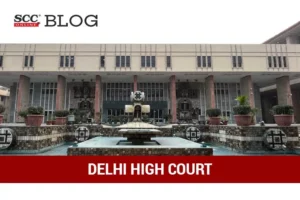Delhi High Court: In a suit filed by PepsiCo Inc. (plaintiff) seeking permanent injunction restraining the defendants from using the trademark ‘MIRINDA', transliteration thereof in Hindi and/or any other language and/or any deceptive variation thereof in relation to their product i.e. country-made liquor and/or in relation to any other business activity in a manner that it infringes plaintiff 1's statutory and common law rights in its registered and well- known mark and/or variants thereof including MIRINDA Marks, as well as passing off their goods as that of the plaintiffs. Jyoti Singh, J., granted ex parte ad interim injunction against the defendants restraining them from using the mark ‘Mirinda' and its transliteration in Hindi, I.e., मिरिंडा in relation to a country-made liquor.
MIRINDA marks are registered trademarks of plaintiff 1, a corporation, duly incorporated under laws of the State of North Carolina, USA, and is engaged in the business of manufacturing and distributing, non-alcoholic beverages, packaged and aerated water, and snack foods. In India, products under MIRINDA marks have been available since 1996 and plaintiff 1 and have been registered or ‘applied' for registrations as trademarks by plaintiff 1 or its subsidiaries in about 190 countries in the world including USA, Australia, Canada, Egypt, Germany, etc.
Plaintiffs learned in December 2021 that Defendant 2 applied for registration of the mark ‘CONTINENTAL MIRINDA BEER'. Defendant 2 is a Director in Defendant 1 company, which is currently using Hindi transliteration of the mark MIRINDA i.e., मिरिंडा in relation to country-made liquor and Defendant 2 had applied for registration of the mark but the application was abandoned.
Counsel for the plaintiff submitted that the use of the impugned marks by the Defendants carries in it an inherent misrepresentation to the consumers that the products offered by them have an association with the Plaintiffs and is causing damage to the goodwill of the MIRINDA marks, amounting to passing off and violation of the common law rights of the plaintiffs.
Counsel for the defendants submitted that the defendants have been extensively using the mark since 2007 in relation to liquor for nearly 15 years now and there has not been a single instance or complaint by any customer alleging that he was confused into buying the defendants' product under an impression that it emanated from plaintiffs' stable. The marks are neither identical/similar nor deceptively similar, the consumer base and the trade channels are also different.
On the aspect of acquiescence, the Court observed that the Plaintiff that there is a delay in approaching the Court, and in any event, assuming there is some delay, that is not enough by itself to deter this Court from granting an injunction, more so when the adoption is dishonest.
The Court noted that the entire structure of Section 29(4) is different from the earlier provisions in Section 29, and this is because the ‘likelihood of confusion' test, which is the essential basis of trademark law, is not incorporated in relation to infringement of the kind Section 29(4) envisions. Section 29 (2) emphasizes similar goods however; Section 29(4) posits the identity or similarity of the mark but in relation to dissimilar goods. Thus, what the Plaintiff is required to establish are cumulative conditions of similarity or identity of marks, repute in India, use of the mark without cause and intent to take unfair advantage, or the use of the impugned mark being detrimental to the distinctive character/repute of the registered mark.
The Court further noted that a bare comparison of the rival marks shows that they are phonetically identical and conceptually like each other and therefore the first ingredient of Section 29(4) stands satisfied. there is disingenuous use of the Plaintiffs' mark MIRINDA by the Defendants, with the intent to encash on the goodwill and reputation associated with their brand and to benefit out of the same, which would be detrimental to the distinctive character of the Plaintiffs' marks and dilute the same.
The Court concluded that the case of the Plaintiffs falls within the scope and ambit of Section 29(4) of the Act, given the strength and repute of MIRINDA marks, degree of similarity with the impugned mark and the chance of the Plaintiffs bridging the gap between soft drinks and country made liquor. The plaintiffs have made out a case of infringement against the Defendants. The balance of convenience also lies in favour of the Plaintiffs and irreparable harm and injury shall be caused to the Plaintiffs if the interim injunction is not confirmed.
Thus, the Court passed an ex parte ad interim injunction restraining defendants from using the trademark ‘MIRINDA', transliteration thereof in Hindi मिरिंडा and/or in any other language and/or any deceptive variation thereof in relation to their product i.e. country-made liquor and/or in relation to any other business activity in a manner that it infringes plaintiff's statutory and common law rights in its registered and well-known mark and/or variants thereof including MIRINDA Marks.
[PepsiCo Inc. V. Jagpin Breweries Limited, 2023 SCC OnLine Del 2542, decided on 01-05-2023]
Advocates who appeared in this case :
Mr. Dayan Krishnan, Senior Advocate with Mr. Dheeraj Nair, Mr. Manish K. Jha, Ms. Shruti Dass and Ms. Ridhima Sharma, Advocates for plaintiff
Ms. Kiran Suri, Senior Advocate with Ms. Aishwarya Kumar and Ms. Prem Lata, Advocates for defendants

